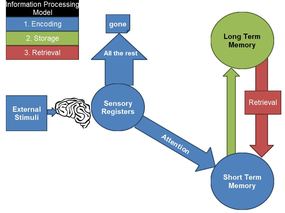Unit 2: Memory - AP Psychology Syllabus and Calendar
Memory Quizlet
ET 2-1 IPM Resources
|
Essential Task 2-1 Describe the information processing model of memory with specific attention to the following steps:
- Encoding: external stimuli, sensory registers, selective attention, reticular formation, short-term memory - Storage: long-term memory, explicit memory (semantic and episodic memories) and implicit memories (emotional and procedural memories) - Retrieval |
ET 2-2 Improve Memory Resources
|
Essential Task 2-2 Outline principles that help improve memory functioning at each stage:
- encoding - attention, chunking, serial positioning effect, deep versus shallow processing, and rote rehearsal - storage - decay theory, elaborative rehearsal, spacing effect, method of loci, and link method - retrieval - retrieval cues and priming |
ET 2-3 Biology of Memory Resources
|
Essential Task 2-3 Describe the physiological systems of memory with specific attention to long-term potentiation and the brain regions where memories are stored.
|
ET 2-4 Forgetting and Memory Construction Resources
|
Essential Task 2-4 Describe specific retrieval problems (anterograde and retrograde amnesia, decay theory, proactive and retroactive interference) and memory construction errors (misinformation effect, eyewitness testimonies, and source amnesia)
|
Helpful LinksMemory - This hour of Radiolab, a look behind the curtain of how memories are made...and forgotten.
Memory Quiz from AP Psychology Commune |

